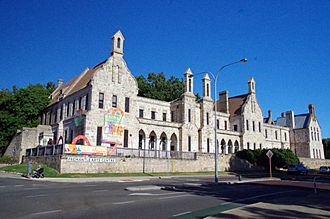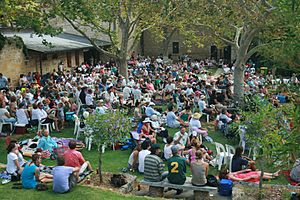Fremantle Arts Centre facts for kids
Quick facts for kids Fremantle Arts Centre |
|
|---|---|

Fremantle Arts Centre
|
|
| General information | |
| Type | Historic building complex |
| Location | Ord Street, Fremantle, Western Australia |
| Coordinates | 32°02′51″S 115°45′14″E / 32.047634°S 115.75382°E |
| Type | State Registered Place |
| Designated | 16 November 1993 |
| Reference no. | 875 |
The Fremantle Arts Centre is a very special place in Fremantle, Western Australia. It's a historic building that now hosts many exciting art shows, classes, and live music events.
This amazing building was built a long time ago, between 1861 and 1868. People who were convicts helped build it. It was first used as a hospital for people with mental health conditions. Today, it's a lively hub for art, offering exhibitions, art classes, and concerts.
You can find it on Ord Street. It's right across from the Fremantle Leisure and Aquatic Centre. It's also close to two schools: John Curtin College of the Arts and CBC Fremantle.
Contents
What Happens at the Arts Centre Today?
The Fremantle Arts Centre has a busy schedule of exhibitions and events. In summer, outdoor concerts often attract thousands of people! Many famous artists and bands have played here. Some of them include Elvis Costello, John Butler, The Waifs, Paul Kelly, Cat Empire, and Eskimo Joe.
The Arts Centre gets money from the City of Fremantle and the Western Australian State Government. This funding helps them put on all their great programs.
A Look Back: History of the Building
The building has a long and interesting history. Before it was built, people needing mental health care in Western Australia stayed in temporary places. When convicts started arriving in 1850, more people needed care. So, in 1857, a new asylum was set up in Scott's Warehouse.
Building the Asylum
The large building we see today overlooks the harbour city. It was one of the biggest public buildings built by convicts in Western Australia. It was designed by Lieutenant-Colonel Sir Edmund Henderson. The plan was for it to hold 50 people.
Building started in 1861 and took four years to finish. Convicts worked on it, guided by James Manning and the Twentieth Company of Engineers. The first patients moved into the asylum in July 1865.
Changes and Overcrowding
Later, in 1886, the Public Works Department took over public buildings. George Temple-Poole designed new parts of the building, which were finished in the late 1880s and early 1890s.
After the Western Australian gold rushes in the 1890s, the asylum became very crowded. More space was needed, so another place called Whitby Falls was bought in 1897.
New Uses for the Building
The asylum continued to operate until the early 1900s. After some concerns, an official review suggested the building was no longer suitable for its purpose. Patients were then moved to other locations between 1901 and 1909.
After that, the building was used for different things. For a while, it housed women who didn't have homes. It was also a midwifery school. Before World War II, it was known as the Old Women's Home. During World War II, it became a headquarters for the American armed forces.
Saving the Building
After the war, the building was used by Fremantle Technical School. In 1957, there was a plan to knock it down to make playing fields for John Curtin High School. But people in the community were upset and fought against this plan. The Mayor of Fremantle, Sir Frederick Samson, helped stop the demolition.
After many years of effort to get money, a big project to restore the building began in 1970. Since 1972, it has been home to the Western Australian Maritime Museum (which has since moved) and the Fremantle Arts Centre.
Fremantle Press and Conservation
In 1976, the Arts Centre inspired the Fremantle Arts Centre Press. This group first published poetry and short stories. It has grown and is now known as the Fremantle Press, publishing many successful authors.
In 2001, a plan was made to help preserve the Fremantle Arts Centre building. In 2007, some restoration work was completed, bringing back parts of the building to their original look.
In 2009, it was announced that the Immigration Museum would close. This allowed for the Fremantle Arts Centre to expand its space and programs.
 | Emma Amos |
 | Edward Mitchell Bannister |
 | Larry D. Alexander |
 | Ernie Barnes |


